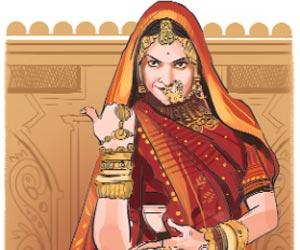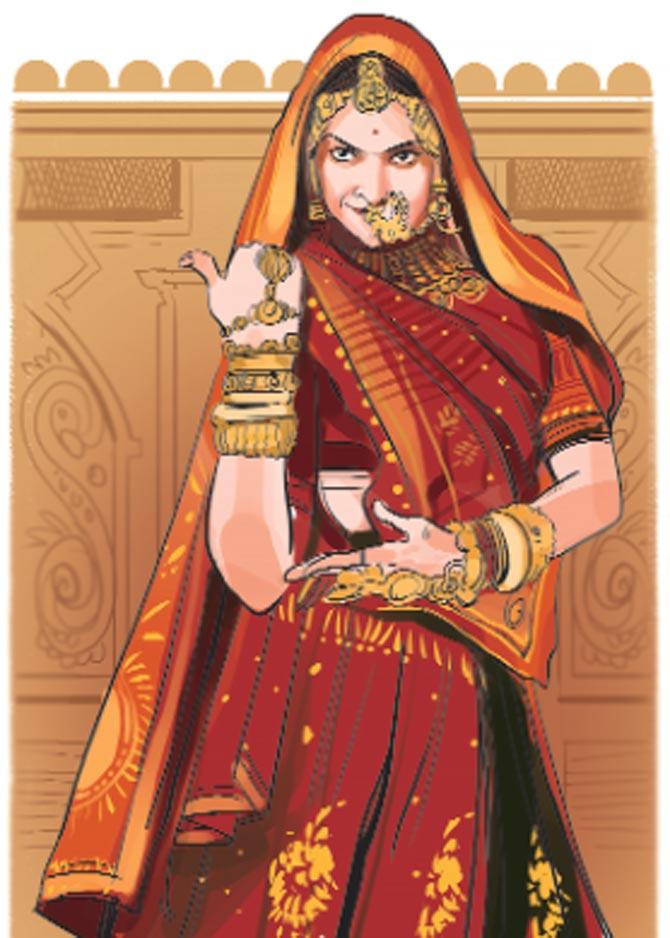The first thing about Padmaavat that no one seems to have noticed, is that it is about two creepy, rival womanisers, with a lovely woman trapped between them. Allauddin Khilji was a savage, unapologetic womaniser


Illustration/Uday Mohite
ADVERTISEMENT
 The first thing about Padmaavat that no one seems to have noticed, is that it is about two creepy, rival womanisers, with a lovely woman trapped between them. Allauddin Khilji was a savage, unapologetic womaniser. But, Rajput king Ratan Singh was also a womaniser, only worse: he was a wolf in customised sheep's clothing. He fell in love with Princess Padmavati of Ceylon, married her, and brought her back to his palace as Wife No 2, even though he was already married to Nagmati. So, the honourable Rajput was a con and a bigamist.
The first thing about Padmaavat that no one seems to have noticed, is that it is about two creepy, rival womanisers, with a lovely woman trapped between them. Allauddin Khilji was a savage, unapologetic womaniser. But, Rajput king Ratan Singh was also a womaniser, only worse: he was a wolf in customised sheep's clothing. He fell in love with Princess Padmavati of Ceylon, married her, and brought her back to his palace as Wife No 2, even though he was already married to Nagmati. So, the honourable Rajput was a con and a bigamist.
The story is set in the 14th century, based on the fictional 16th century poem, Padmavat by Malik Muhammad Jayasi. King Ratan Singh of Chittor, Rajasthan, travels to Ceylon (Sri Lanka), falls in love with the beautiful, feisty Buddhist Princess Padmavati, a hunter, marries her, and brings her back — as his second wife. A Sri Lankan woman, who boldly chose her own husband, swiftly becomes her Indian husband's toy, shrouded in a ghunghat, weighed down in 10kg bejewelled skirts, and brainwashed into believing that women's honour is more important than life itself. She is not furious with her husband on discovering he is a cheating bigamist, nor is there bitterness with Wife No 1 — and Bhansali is a "souten specialist", as we have seen in Devdas and Bajirao Mastani. Eventually, when Allauddin Khilji, the Sultan of Delhi, hearing of Padmavati's beauty, attacks Chittor to claim her, she commits jauhar or mass suicide with the other women, to prevent being "dishonoured". The film's core — gloriously celebrating fake Rajput valour and patriarchal, misogynistic notions of women's honour that send them to the pyre — is horrific. Padmavati actually tells her husband, "Jauhar mera hakk hai (Mass suicide is my right)." It is infuriating to hear this in 2018.
It is hard to ignore the dramatic reversal in Bhansali's politics: could contemporary Indian politics have dictated his choices as an artist? In Bajirao Mastani, he courageously celebrated a historic, Hindu-Muslim romance, technically today's love jihad — whereas in Padmaavat, the Hindu king is gloriously valorous, while the Muslim Sultan is a savage monster, who may be having a homosexual affair with his slave Malik Kafur.
Remarkably, the film opens up Bollywood's cinematic imagination to South Asia: it opens in Afghanistan, travels to Ceylon and India; there are references to Misr (Egypt) and the dialogues include beautiful Persian and Arabic words like bepanah and istiqbal.
The film is spectacular, both in scale and artistic imagination, and few can rival Bhansali in the art of song picturisation. Deepika Padukone is gorgeous as ever; her Padmavati also has intelligence, dignity and courage. Shahid Kapoor is a picture of bejewelled restraint. But Ranveer Singh walks away with the film: his ferocious, lusty Muslim warlord makes him far more interesting than the mannequinn'd Rajput king. The screenplay and editing pack in brisk drama, even though the film is long at 2 hours and 44 mins. Sudeep Chatterjee's cinematography is exquisite, as are the production design, costumes and jewellery. The music, by Sanchit Balhara and Sanjay Leela Bhansali, is good, if uneven. The Ghoomar song is a highlight of the film.
Normally, I revel in the sheer gorgeousness of a Bhansali film. But here, it is a dangerous and fatal beauty, glorifying criminals by cloaking them in jewels and silk floss. If the King had married Padmavati and lived on in Sri Lanka, I wonder if, influenced by Buddhist compassion instead of fake Rajput valour, their descendants would be far more civilised.
Meenakshi Shedde is South Asia Consultant to the Berlin Film Festival, award-winning critic, curator to festivals worldwide and journalist. Reach her at meenakshishedde@gmail.com
Catch up on all the latest Mumbai, National and International news here
Download the new mid-day Android and iOS apps to get updates on all the latest and trending stories on the go
 Subscribe today by clicking the link and stay updated with the latest news!" Click here!
Subscribe today by clicking the link and stay updated with the latest news!" Click here!






